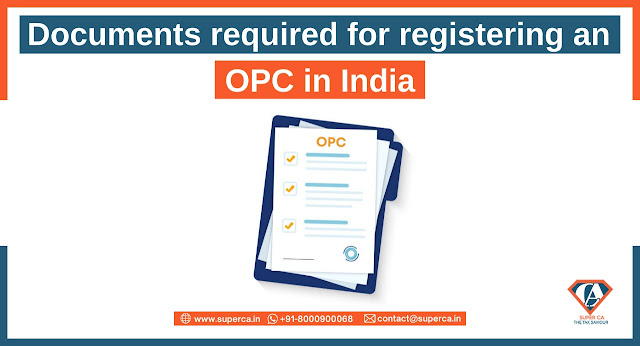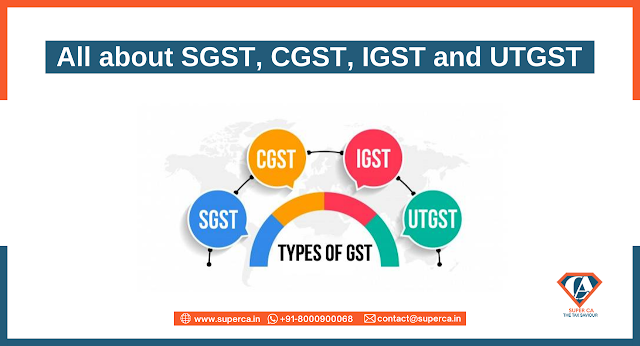Documents required for Registration of a One Person Company (OPC) in India
Company Registration is the overriding and most important step for any business organization. To protect your business and secure its rights, company registration is very essential. It shields the business from personal liability and protects from other risks and losses and at the same time provides more customer attraction, more capital contribution, greater stability and increases the company's potential to expand. Before going for company registration, you should have a clarity on the kind of business you are into, your goals and objectives since each of these types come with their own legal implications.
There are various forms of businesses available that one can register with both as a simple owner or as partnerships.
Among the single owner company forms, ‘One Person Company’ in India is a new concept that has been introduced with the Company's Act 2013. In OPC, the company can be registered under MCA and Companies Act, 2013. If you want to start a corporation with less compliance, then One Person Company registration is the best one for you as the compliance requirements are lesser than that of a private company.
In brief, OPC refers to a Company which has only one person as its member. It is a fusion of Sole-Proprietorship and Company form of business. In order to enable a person who is carrying on the business in the Sole-Proprietorship firm to enter into a corporate outline with relaxed or concessional requirements under the Act, the Companies Act 2013 had brought in the new concept of OPC.
If you are looking to get your company registered as OPC and wish to know the essential Documents required for the same, you’re in the right place. In this article, we’ll look at the documents from.
Prerequisite
Before going for Online Company Registration, you should be clear about some basic requirements. For starting an OPC in India, a minimum of one person is required. The Companies Act, 2013 provides that an individual can form a company with one single member and one director. The director and member can be the same person but can be a member in only one OPC. Among the directors, one person must be an Indian resident.
The minimum authorised & subscribed share capital capital of Rs.1 lakh is prescribed.Further, the name of the OPC should be unique and should not be similar to any existing company name or trademark.
As the above requirements are fulfilled, the first step is to obtain the Digital Signature Certificate. DSC is very important for the company registration and should be acquired by only those agencies which are appointed by the controller of certification agencies (CCA). If you already have a digital signature then you don’t need to apply for another one for company registration but you must ensure its validity as agencies issue DSC’s with one or two year validity after expiry you have to renew it. You must first apply for it before initiating the Online company registration process if you do not have a DSC,
Once the DSC is made, the next step is to apply for the Director Identification Number (DIN) of the proposed Director in SPICe Form along with the name and the address proof of the director.
The following step is to get the Company’s name approved. The name can be approved in the Form SPICe+ 32 application. Only one preferred name along with the significance of keeping that name can be given in the Form SPICe+ 32 application. In case the name gets rejected, another name can be submitted by applying another Form SPICe+ 32 application.
Once the name is approved by the MCA, we move on to the next step which is knowing about documents required to be submitted to the ROC
Documents required for OPC Registration
➤ Proof of Identity
Proof of identity for Directors/Shareholder (Voter ID/Passport/Driving License)
PAN Card for Indian Nationals , Passport for Foreign Nationals ( Both are Mandatory)
Proof of nationality for Foreign Nationals
Address proof of Directors and Shareholder (Out of Latest bank statement, telephone bill, mobile bill, electricity bill or gas bill should be submitted as a residence proof. Ensure that statement shouldn’t be more than 2 months old)
➤ Proof of Registered office
You must submit the following documents as proof of registered office during the company registration process.
Conveyance/ Lease deed/Rent Agreement etc. along with rent receipts (any one)
Copy of the utility bills (Telephone/Gas/Electricity bill) (must not older than two months)
If the registered office is rented, the rent agreement and a NOC from the landlord has to be submitted. No objection certificate refers to consent of the landlord to allow the LLP to use the place as ‘registered office’.This acts as an authorization from the Landlord to use the premises by the company as its registered office.
➤ Further, the Memorandum of Association (MoA) and Article of Association (AoA) are to be submitted to the ROC. The Memorandum of Association (MoA) consists of the objectives to be followed by the Company or stating the business for which the company is going to be incorporated, whereas the Articles of the Association (AoA) lays down the by-laws on which the company will operate.
➤As we know that in OPC, only one Director and a member is present, a Nominee has to be appointed and the consent of the Nominee is to be taken along with the PAN and Aadhar card in Form INC 3. Further, the declaration and consent of the proposed Director is also taken in Form 9 and DIR 2 respectively. Apart from all, you need a declaration by a professional certifying that all the compliances are met.
➤On verification of all documents, the Registrar of Companies (ROC) will issue a Certificate of Incorporation and then you can commence your business.





Comments
Post a Comment